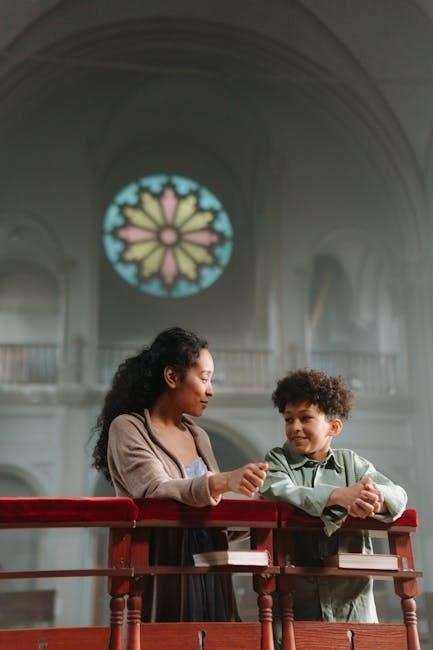undoing the knots five generations of american catholic anti-blackness pdf
This book explores the entanglement of Catholicism and anti-Blackness in America through five generations, weaving narrative history, theology, and critical race theory to address racial injustice․
Overview of the Book and Its Author
Undoing the Knots: Five Generations of American Catholic Anti-Blackness is a groundbreaking work by Maureen O’Connell, a theologian and scholar, that examines the intertwined histories of Catholicism and anti-Black racism in America․ The book traces the author’s family history, exploring how Catholic identity and racial attitudes evolved over five generations, from immigration to the present․ O’Connell weaves personal narrative with historical analysis, revealing how Catholic institutions and teachings perpetuated racial inequality․ By blending theology, critical race theory, and narrative history, she exposes the “dangerous memories” of Catholic complicity in anti-Blackness․ This work is both a personal reckoning and a call to action, urging the Catholic Church and its members to confront and dismantle systemic racism․
The Significance of the Title “Undoing the Knots”
The title Undoing the Knots metaphorically captures the process of unraveling deeply entrenched racial prejudices within American Catholicism․ “Knots” symbolize the complex, intertwined histories of Catholic identity and anti-Blackness, which have been perpetuated across generations․ By examining these knots, Maureen O’Connell aims to expose and dismantle the systemic racial biases embedded in Catholic teachings and institutions․ The title reflects both the historical analysis and the call to action, emphasizing the need for healing and reconciliation․ It draws inspiration from theological concepts like “dangerous memories,” urging a confrontation with past injustices to pave the way for a more inclusive future․ Ultimately, the title signifies a journey toward undoing the binds of racism and moving toward racial justice within the Catholic Church․
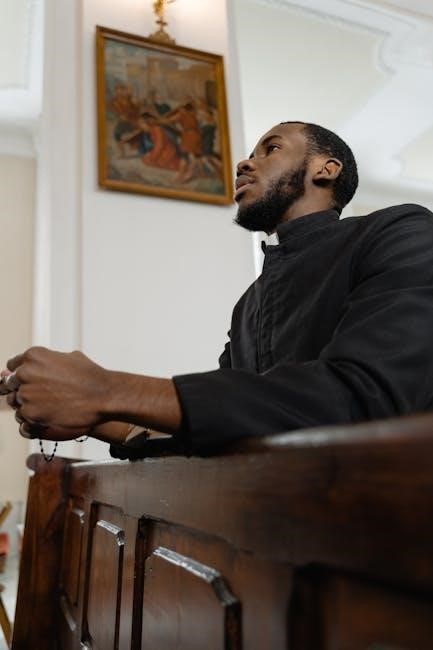
Historical Context of American Catholic Anti-Blackness
American Catholic anti-Blackness traces its roots to early Catholic immigrants’ encounters with race in America, evolving into systemic racial segregation within Church institutions and communities over time․
Origins of Anti-Blackness in the Catholic Church
The origins of anti-Blackness in the Catholic Church can be traced to the early encounters of European Catholics with African populations during colonization and the transatlantic slave trade․ The Church’s complicity in these systems laid the groundwork for racialized theological interpretations that dehumanized Black people․ Catholic teachings were often used to justify the enslavement and subjugation of Africans, framing them as “heathens” in need of salvation․ This theological justification perpetuated racial hierarchies and reinforced white supremacy․ The failure of Church leaders to challenge these practices allowed anti-Blackness to become deeply embedded within Catholic institutions and culture, shaping generations of racial inequality and injustice․
The Role of Catholic Institutions in Perpetuating Racial Inequality
Catholic institutions played a significant role in perpetuating racial inequality through their active participation in and silence on systemic racism․ Schools, hospitals, and other Church-affiliated organizations often reinforced racial segregation and discrimination․ For example, many Catholic schools and parishes were segregated, denying Black Catholics equal access to resources and opportunities․ The Church’s hierarchy rarely challenged these practices, allowing racial injustice to persist․ Additionally, Catholic institutions frequently overlooked the needs of Black communities, failing to address their unique struggles․ This complicity in racial inequality reinforced anti-Blackness within both the Church and broader society, contributing to the historical and ongoing marginalization of Black Catholics․
The Five Generations Examined in the Book
The book traces five generations of an American Catholic family, exploring their evolving relationship with race, from early immigration to contemporary struggles with anti-Blackness and racial justice․
Generation 1: Early Immigrants and Their Encounter with Race in America
This generation represents the initial wave of Catholic immigrants who arrived in America, bringing with them cultural and religious identities shaped by their homeland․ Their encounter with race in America introduced them to a society deeply divided by racial hierarchies․ Many of these immigrants, often marginalized themselves, were socialized into the existing racial order, adopting prejudices that perpetuated anti-Blackness․ The book examines how their experiences of discrimination and assimilation influenced their complicity in racial inequality; Through family histories, Maureen O’Connell reveals how these early immigrants laid the groundwork for future generations’ complex relationships with race․ Their story highlights the intersection of Catholic identity and racial socialization, setting the stage for the theological and social tensions explored in later chapters․
Generation 2: The Rise of Institutional Anti-Blackness
This generation marks the solidification of anti-Blackness within Catholic institutions, as the Church became complicit in perpetuating racial inequality․ Catholic schools, hospitals, and parishes often mirrored societal segregation, with Black Catholics excluded from leadership roles and denied equal access to resources․ Theological justifications for racial hierarchies emerged, framing anti-Blackness as morally acceptable․ Maureen O’Connell traces how institutional policies reinforced racial segregation, embedding anti-Black attitudes into the fabric of Catholic life․ This period saw the normalization of exclusionary practices, further marginalizing Black Catholics and deepening the racial divide․ The rise of institutional anti-Blackness during this generation set a troubling precedent, shaping the Church’s role in racial injustice for decades to come․
Generation 3: The Church’s Response to the Civil Rights Movement
During the Civil Rights Movement, the Catholic Church’s response was marked by both solidarity and resistance․ While some Catholic leaders actively supported racial equality, others within the institution hesitated, perpetuating systemic racism․ Maureen O’Connell examines how the Church’s teachings on social justice often conflicted with its complicity in racial segregation․ This generation saw the rise of Black Catholic activism, as individuals and groups challenged the Church to align its actions with its moral teachings․ The book highlights key moments, such as the 1968 Riverside Church speech and the formation of the National Black Catholic Clergy Caucus, which demanded greater inclusion and racial justice within the Church․ Despite progress, the era also revealed the deep-rooted challenges of dismantling anti-Blackness in Catholic institutions․
Generation 4: Modern Manifestations of Anti-Blackness
In the modern era, anti-Blackness within the Catholic Church has evolved into more subtle yet pervasive forms․ Maureen O’Connell examines how systemic racism persists in Catholic institutions, often masked by progressive rhetoric․ This generation witnesses the Church grappling with issues like racial tokenism, exclusionary practices, and the marginalization of Black voices․ Despite efforts to address diversity, anti-Blackness manifests in the lack of representation in leadership, the erasure of Black Catholic history, and the failure to confront microaggressions․ The book highlights how Black Catholics continue to navigate these challenges, advocating for equity and inclusion while facing resistance from within the Church․ This section underscores the ongoing struggle to reconcile the Church’s mission of justice with its complicity in racial inequality․
Generation 5: Contemporary Efforts Toward Racial Healing
Generation 5 focuses on contemporary efforts to address and dismantle anti-Blackness within the Catholic Church․ Maureen O’Connell highlights the growing awareness of systemic racism and the emergence of initiatives aimed at racial healing․ This generation sees Black Catholics asserting their voices, demanding representation, and advocating for equity․ The book explores modern movements, such as diversity and inclusion programs, racial justice dialogues, and the integration of Black Catholic history into Church teachings․ It also emphasizes the role of education and theological reflection in confronting anti-Blackness․ While challenges persist, this generation represents a turning point, offering hope for a more inclusive and just Catholic future through collective action and accountability․
Theological Perspectives on Anti-Blackness
Maureen O’Connell explores how Catholic teachings have been interpreted to perpetuate or challenge anti-Blackness, emphasizing the concept of “dangerous memories” and their theological implications․
Catholic Teachings and Their Interpretation Regarding Race
Maureen O’Connell examines how Catholic teachings have been interpreted to justify or challenge anti-Blackness, highlighting the tension between universal ideals and racial bias․ She explores how the Church’s teachings on human dignity and solidarity have often been selectively applied, perpetuating racial inequality․ The concept of “dangerous memories” emerges as a theological framework to confront historical injustices and their ongoing impact․ O’Connell argues that reinterpreting Catholic teachings through the lens of racial justice can foster healing and reconciliation․ By tracing her family’s entanglement with race, she illustrates how religious beliefs shape—and are shaped by—cultural attitudes toward race, offering a critical perspective on the Church’s role in perpetuating or dismantling anti-Blackness․
The Concept of “Dangerous Memories” in Theological Context
Maureen O’Connell engages with the theological concept of “dangerous memories,” a term popularized by Johann Baptist Metz, to explore how unearthing painful historical truths can challenge systemic injustice․ These memories, often suppressed or distorted, reveal the Catholic Church’s complicity in anti-Blackness and racial oppression․ By examining her family’s history, O’Connell illustrates how these memories disrupt complacent narratives and call for accountability․ Theologically, dangerous memories compel a reckoning with the past, offering a pathway to redemption and justice․ This framework underscores the moral imperative to confront racial sin and its lingering effects, urging the Church to embrace a more honest and inclusive understanding of its role in perpetuating or dismantling racial inequality․
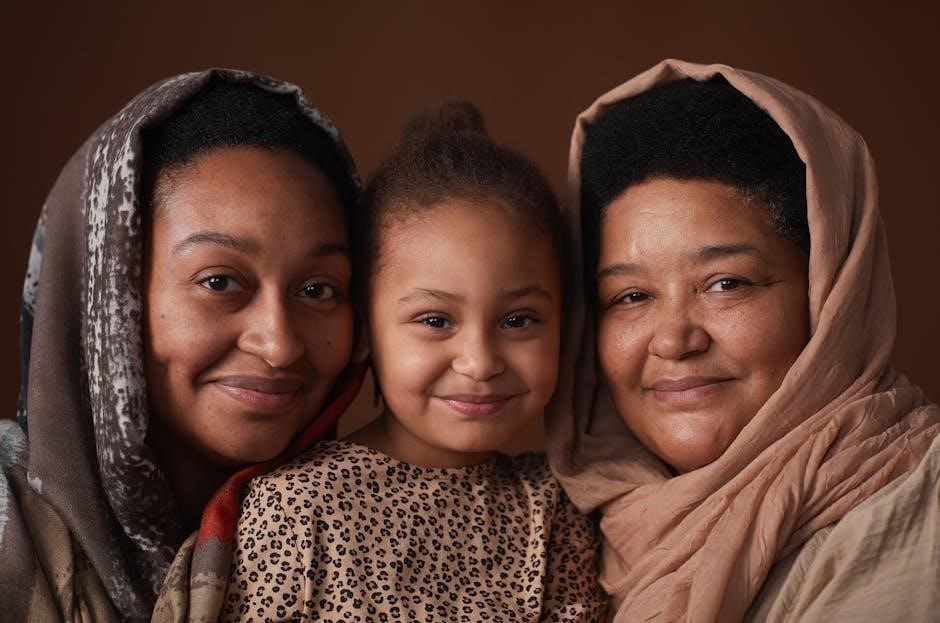
Critical Race Theory and Its Application
Critical Race Theory (CRT) is applied to analyze systemic racial injustice within Catholicism, examining how power structures perpetuate anti-Blackness and advocating for equitable transformation․
Intersection of Critical Race Theory with Catholic Theology
The book examines how Critical Race Theory (CRT) intersects with Catholic theology, revealing systemic racial injustice within Catholic institutions․ By analyzing power structures and historical narratives, CRT exposes how anti-Blackness has been embedded in Catholic teachings and practices․ The concept of “dangerous memories,” rooted in theological reflection, highlights the Church’s complicity in racial oppression․ This intersection challenges Catholics to confront their role in perpetuating inequality and seeks to align theological principles with racial justice․ The author uses CRT to critique how Catholicism has historically marginalized Black people, urging a reexamination of doctrine and practice․ This synthesis of CRT and Catholic theology offers a framework for dismantling anti-Blackness and fostering a more equitable faith community․
Narrative History as a Tool for Understanding Racial Injustice
Narrative history plays a pivotal role in unraveling the complexities of racial injustice, particularly within the Catholic Church․ By weaving together personal and historical narratives, the book provides a compelling lens through which to examine the intersections of race, religion, and power․ These stories humanize the abstract concepts of anti-Blackness, making the systemic nature of racial injustice more relatable and tangible․ Through this approach, the author challenges readers to engage emotionally and intellectually with the historical context of racial oppression․ Narrative history not only illuminates the past but also serves as a mirror to reflect on the present, urging individuals and institutions to confront their complicity in perpetuating inequality․ This method fosters empathy and understanding, essential for dismantling anti-Blackness and advancing racial justice․
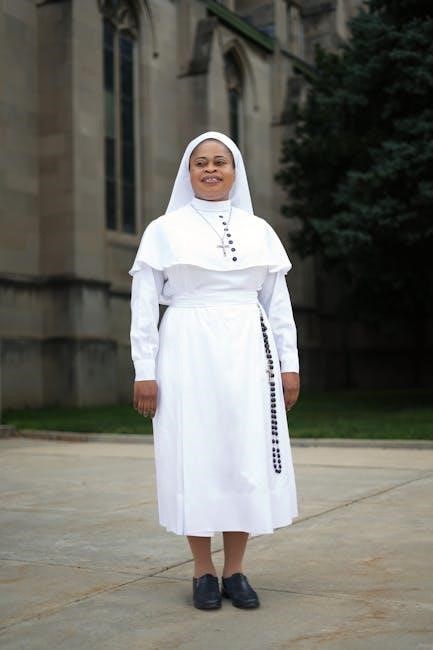
Case Studies and Personal Narratives
This section delves into specific case studies and personal narratives, such as Maureen O’Connell’s family history, to illustrate the emotional and intellectual impact of anti-Blackness within Catholicism․
Maureen O’Connell’s Family History and Its Relevance
Maureen O’Connell’s family history serves as a compelling case study, tracing her Catholic family’s entanglement with race and racism from their immigration to America․ Through personal narratives, O’Connell explores how her ancestors navigated racial hierarchies, often benefiting from systems that oppressed Black people․ This intimate examination reveals the emotional and theological complexities of complicity in anti-Blackness․ By excavating these “dangerous memories,” O’Connell highlights how Catholic teachings were interpreted to justify racial inequality․ Her story underscores the intergenerational nature of anti-Blackness, showing how even well-intentioned individuals contributed to systemic racism․ This personal journey offers a powerful lens for understanding the broader dynamics of Catholic anti-Blackness and the need for accountability and healing․
Specific Historical Events Highlighting Anti-Blackness
Key historical events underscore the Catholic Church’s complicity in anti-Blackness, such as its support for segregation and its silence during the Civil Rights Movement․ The Church’s involvement in institutions like schools and hospitals often perpetuated racial inequality, as these spaces frequently excluded or marginalized Black individuals․ Additionally, the Church’s alignment with societal structures that upheld white supremacy further entrenched anti-Blackness; These events reveal a pattern of complicity and moral failure, highlighting the need for accountability and reconciliation․ By examining these historical moments, the book sheds light on how the Catholic Church’s actions and inactions contributed to systemic racism, emphasizing the urgency of addressing these injustices in the present day․

Modern Implications and Challenges
The Catholic Church faces ongoing challenges in addressing anti-Blackness, including resistance to diversity efforts and systemic change, highlighting the need for active engagement with racial justice initiatives today․
Current State of Racial Relations Within the Catholic Church
The Catholic Church continues to grapple with racial tensions, reflecting broader societal challenges․ While some progress has been made in promoting diversity and inclusion, systemic barriers remain․ Many Catholic institutions are engaging in dialogues about race, yet resistance to meaningful change persists․ The Church’s historical complicity in anti-Blackness still impacts its ability to foster true racial equity․ Efforts to address these issues often face pushback, particularly from those unwilling to confront uncomfortable truths․ Education and accountability are seen as critical steps forward․ By examining its past and present, the Church can work toward a more inclusive future, but it requires sustained commitment and collective action․
Resistance to Change and Its Impact on Racial Justice
Resistance to change within the Catholic Church poses a significant barrier to achieving racial justice․ Many members and institutions cling to traditional practices and beliefs, often ignoring or downplaying the historical and ongoing impacts of anti-Blackness․ This resistance stems from a reluctance to confront uncomfortable truths about the Church’s past and its role in perpetuating racial inequality․ By avoiding these conversations, the Church fails to address systemic issues, hindering progress toward racial healing․ Such resistance not only maintains the status quo but also alienates marginalized communities, further entrenching divisions; Without a willingness to confront and dismantle these barriers, meaningful racial justice within the Church remains elusive, perpetuating cycles of inequality and injustice․ Change requires accountability and a commitment to transformation at all levels․
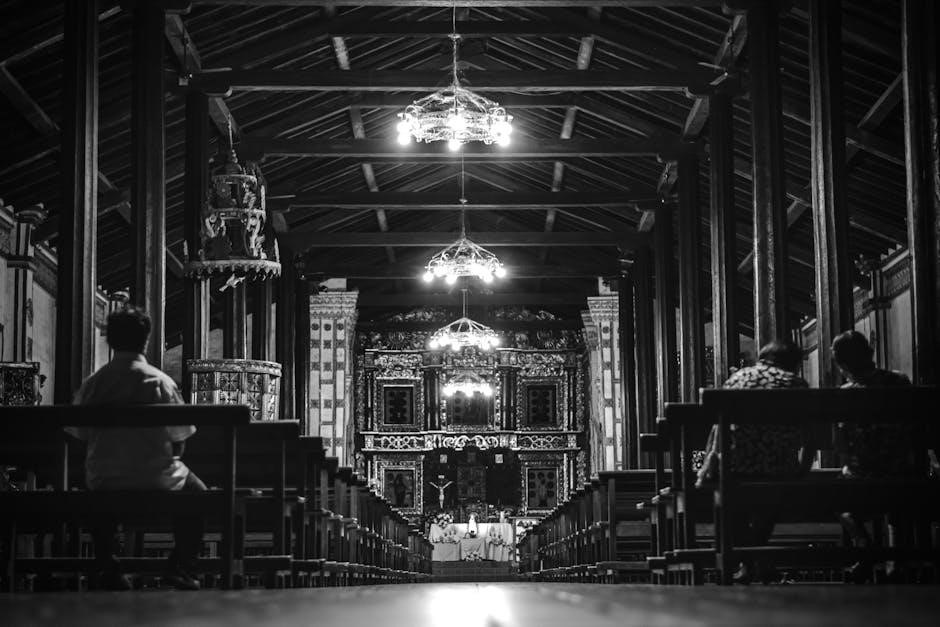
Towards Racial Healing and Justice
The book emphasizes the necessity of truth-telling, education, and dialogue to address anti-Blackness․ It calls for institutional accountability and collective efforts to create a more inclusive Catholic future․
Practical Steps for Individuals and Institutions
Undoing the Knots urges individuals to engage in self-reflection and education about racial injustice․ Institutions must adopt policies promoting equity and inclusion․ Education plays a vital role in dismantling systemic racism, fostering dialogue, and encouraging collective accountability․ By integrating critical race theory with Catholic teachings, the book offers a pathway to reconciliation and justice, emphasizing the need for both personal and structural transformation to address anti-Blackness․ These steps aim to create a more inclusive and equitable future for all within the Catholic Church and beyond․
The Role of Education in Undoing Anti-Blackness
Educational initiatives are crucial in dismantling anti-Blackness within Catholic communities․ By incorporating diverse narratives and historical contexts into curricula, schools can foster empathy and understanding․ Theological education must emphasize the Church’s role in perpetuating racial inequalities, encouraging students to critically examine these issues․ Community-based programs and workshops can also provide spaces for dialogue and reflection․ Maureen O’Connell’s work highlights the importance of educating future generations about the intersections of faith and race, ensuring that the Church moves toward a more inclusive and just future․ Education serves as a powerful tool for transformation and healing in the ongoing struggle against anti-Blackness․
The book concludes by urging Catholics to confront racial injustices and commit to transformative change, fostering an inclusive future rooted in justice and compassion for all․
Reflecting on the Journey and Its Significance
The book’s examination of five generations reveals a complex interplay between faith and racism, highlighting how personal and institutional histories shape systemic injustice․ By tracing her family’s journey, Maureen O’Connell underscores the enduring impact of anti-Blackness within Catholicism․ This narrative not only illuminates the past but also serves as a mirror for the present, urging readers to confront uncomfortable truths․ The significance lies in its ability to bridge personal storytelling with broader societal issues, offering a compelling case for racial healing․ Through this lens, the book becomes a powerful tool for reflection, encouraging individuals and institutions to reckon with their roles in perpetuating or dismantling racial inequities․
A Vision for a More Inclusive and Just Catholic Future
The book envisions a future where Catholicism embraces racial justice, fostering inclusivity and equity․ By acknowledging past wrongs, the Church can move toward reconciliation․ Education and dialogue are key, empowering individuals to challenge anti-Blackness; This vision calls for institutional accountability and personal transformation, ensuring that Catholic teachings align with principles of equality and compassion․

